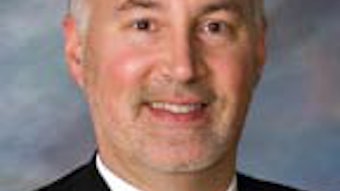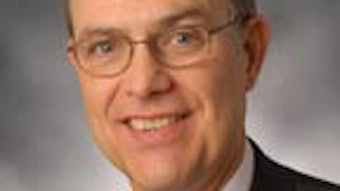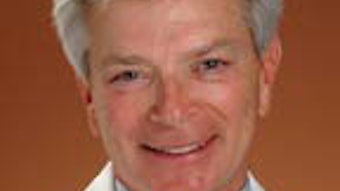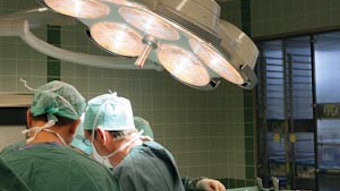Interview with Bryan Ambro, MD, MS, President, Maryland Society of Otolaryngology
Bulletin: Tell readers what led you to become president of the Maryland Society of Otolaryngology-Head and Neck Surgery. Dr. Ambro: After completing residency in Philadelphia and a Facial Plastic and Reconstructive Surgery fellowship in Seattle, I joined the University of Maryland Medical Center Department of Otolaryngology in 2006. The Maryland Society of Otolaryngology (MSO) leadership typically alternates between an otolaryngologist in private practice one year and in an academic practice the next. The nomination/election process is not terribly complex, and in fact it has been increasingly common for the president to be elected in absentia. My guess is that members believe there is less of a chance for the elected individual to respectfully decline. At least that’s how I came to hold the position. Several years ago, our president was elected while he took a restroom break. Bulletin: Until 2006, the focus of the MSO-HNS was centered on educational activities. However, that year the priorities shifted to the legislative arena. What happened? Dr. Ambro: That was the year that the audiology scope-of-practice issue arose. The amount of work required to properly research and defend our position was simply too cumbersome for our president to handle on his own. It became apparent that we needed to increase our advocacy efforts and we hired a lobbyist whose experience with the legislative process was greatly needed. Since that time, she has continued to be instrumental in voicing our specialty’s concerns in Annapolis. Bulletin: In what ways has the AAO-HNS helped on the scope-of-practice bill and other issues? Dr. Ambro: Throughout the two-year scope-of-practice battle, the Academy provided significant support in the form of testimony (written and oral), as well as financial backing to help the efforts of our lobbyist. They were involved every step of the way and were critical to our success in preventing the expansion of audiology’s practice scope. The Academy has always been a great resource for information regarding the status of legislative issues that have been previously encountered or are ongoing in other states. In turn, our Society has involved the Academy on all of our issues so that our experiences in Maryland can be shared with other state societies. Bulletin: How has the role of your lobbyist/executive director changed over the past few years? Dr. Ambro: Our lobbyist and her team have played an important role in maintaining a presence for the MSO in the state legislature. Although the number and complexity of issues that directly impact our state’s otolaryngologists can vary from one year to the next, she continually keeps us current with all aspects of Maryland healthcare legislation. She and her team are truly our eyes and ears in Annapolis. Bulletin: Tell us about any recent successes and pending issues, and how they impact Maryland’s otolaryngologists. Dr. Ambro: Recent legislative successes include the overturning of CareFirst BlueCross/BlueShield’s decision to extend a balance billing prohibition on hearing aid devices that is contained in the Federal Employee Health Plan to all of its Maryland products. MSO’s advocacy was effective in CareFirst rescinding its policy for all products except for the Federal Plan. Our efforts are now focused on changing the Federal Employee Benefit Plan’s policy, which affects many of Maryland’s otolaryngologists and their patients. Another huge success was the recent passage of the “Assignment of Benefits” bill. Through the efforts of several key legislators, MedChi (the Maryland state medical society), and MSO leadership, the passage of “Assignment of Benefits” provides Maryland physicians (especially hospital-based physicians) with a critical tool for negotiation with insurers as we continue to move forward into the changing climate under new healthcare legislation. This bill will also have a significant impact on the retention and recruitment of physicians in the state of Maryland. Bulletin: What challenges do you face in your society’s operation? Dr. Ambro: Our biggest challenge is to get more of our state’s otolaryngologists to participate in our society. At the beginning of my term, I typed a letter outlining our recent legislative successes as well as our future advocacy goals, and asked for dues that would go directly toward protecting Maryland otolaryngologists and their patients’ interests. I sent this to nearly 400 otolaryngologists and received dues from less than 60. Currently, almost 100 percent of our dues goes toward supporting our advocacy efforts, and with the Society’s limited coffers, we don’t have very much financial flexibility to cope with unforeseen issues. As the current president, my goal is to continue to raise awareness among not only our members, but all our of state’s otolaryngologists. Bulletin: What advice do you have for other state societies that are considering taking a more active role in legislative and regulatory activities? Dr. Ambro: If the funding and interest for a lobbyist/executive director is present, I would strongly encourage other state societies to become more actively involved in the legislative process. Our Society’s successes could not have been achieved without lobbyist support. Helping your members to understand the role government plays in shaping their practices will hopefully embolden them to become and stay engaged in advocacy efforts that positively impact our specialty and the care of our patients. The AAO-HNS applauds the volunteerism and commitment of our state otolaryngology society leaders, including Dr. Ambro.
Bulletin: Tell readers what led you to become president of the Maryland Society of Otolaryngology-Head and Neck Surgery.
Dr. Ambro: After completing residency in Philadelphia and a Facial Plastic and Reconstructive Surgery fellowship in Seattle, I joined the University of Maryland Medical Center Department of Otolaryngology in 2006.
The Maryland Society of Otolaryngology (MSO) leadership typically alternates between an otolaryngologist in private practice one year and in an academic practice the next. The nomination/election process is not terribly complex, and in fact it has been increasingly common for the president to be elected in absentia. My guess is that members believe there is less of a chance for the elected individual to respectfully decline. At least that’s how I came to hold the position. Several years ago, our president was elected while he took a restroom break.
Bulletin: Until 2006, the focus of the MSO-HNS was centered on educational activities. However, that year the priorities shifted to the legislative arena. What happened?
Dr. Ambro: That was the year that the audiology scope-of-practice issue arose. The amount of work required to properly research and defend our position was simply too cumbersome for our president to handle on his own. It became apparent that we needed to increase our advocacy efforts and we hired a lobbyist whose experience with the legislative process was greatly needed. Since that time, she has continued to be instrumental in voicing our specialty’s concerns in Annapolis.
Bulletin: In what ways has the AAO-HNS helped on the scope-of-practice bill and other issues?
Dr. Ambro: Throughout the two-year scope-of-practice battle, the Academy provided significant support in the form of testimony (written and oral), as well as financial backing to help the efforts of our lobbyist. They were involved every step of the way and were critical to our success in preventing the expansion of audiology’s practice scope.
The Academy has always been a great resource for information regarding the status of legislative issues that have been previously encountered or are ongoing in other states. In turn, our Society has involved the Academy on all of our issues so that our experiences in Maryland can be shared with other state societies.
Bulletin: How has the role of your lobbyist/executive director changed over the past few years?
Dr. Ambro: Our lobbyist and her team have played an important role in maintaining a presence for the MSO in the state legislature. Although the number and complexity of issues that directly impact our state’s otolaryngologists can vary from one year to the next, she continually keeps us current with all aspects of Maryland healthcare legislation. She and her team are truly our eyes and ears in Annapolis.
Bulletin: Tell us about any recent successes and pending issues, and how they impact Maryland’s otolaryngologists.
Dr. Ambro: Recent legislative successes include the overturning of CareFirst BlueCross/BlueShield’s decision to extend a balance billing prohibition on hearing aid devices that is contained in the Federal Employee Health Plan to all of its Maryland products. MSO’s advocacy was effective in CareFirst rescinding its policy for all products except for the Federal Plan. Our efforts are now focused on changing the Federal Employee Benefit Plan’s policy, which affects many of Maryland’s otolaryngologists and their patients.
Another huge success was the recent passage of the “Assignment of Benefits” bill. Through the efforts of several key legislators, MedChi (the Maryland state medical society), and MSO leadership, the passage of “Assignment of Benefits” provides Maryland physicians (especially hospital-based physicians) with a critical tool for negotiation with insurers as we continue to move forward into the changing climate under new healthcare legislation. This bill will also have a significant impact on the retention and recruitment of physicians in the state of Maryland.
Bulletin: What challenges do you face in your society’s operation?
Dr. Ambro: Our biggest challenge is to get more of our state’s otolaryngologists to participate in our society. At the beginning of my term, I typed a letter outlining our recent legislative successes as well as our future advocacy goals, and asked for dues that would go directly toward protecting Maryland otolaryngologists and their patients’ interests. I sent this to nearly 400 otolaryngologists and received dues from less than 60. Currently, almost 100 percent of our dues goes toward supporting our advocacy efforts, and with the Society’s limited coffers, we don’t have very much financial flexibility to cope with unforeseen issues. As the current president, my goal is to continue to raise awareness among not only our members, but all our of state’s otolaryngologists.
Bulletin: What advice do you have for other state societies that are considering taking a more active role in legislative and regulatory activities?
Dr. Ambro: If the funding and interest for a lobbyist/executive director is present, I would strongly encourage other state societies to become more actively involved in the legislative process. Our Society’s successes could not have been achieved without lobbyist support. Helping your members to understand the role government plays in shaping their practices will hopefully embolden them to become and stay engaged in advocacy efforts that positively impact our specialty and the care of our patients.
The AAO-HNS applauds the volunteerism and commitment of our state otolaryngology society leaders, including Dr. Ambro.












